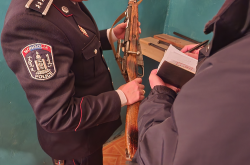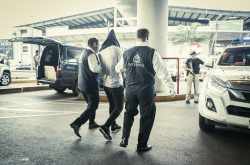Following the smoking gun
A firearm recovered from a crime may not always be the ‘smoking gun’ but it does provide essential clues behind its diversion and misuse. We help member countries to identify illicit firearms, their illegal movements and those responsible for their trafficking. We can also help uncover links to other crime scenes and suspects internationally.
Tracing the history and ownership of a recovered firearm can provide valuable investigative leads. In addition, every firearm is unique and can be identified by its serial number, make, model and caliber as well as by its ballistic ‘fingerprint’. Comparing ballistics evidence of recovered cartridge casings and ammunition is therefore crucial to investigations.
Putting the pieces of the puzzle together is extremely complex, so we have developed expert tools to guide law enforcement authorities in their investigations into firearms trafficking.

Tracing firearms and sharing ballistic data
We help law enforcement agencies address firearms crimes through three specific tools:
- The Illicit Arms Records and Tracing Management System (iARMS) = This is the only global database of illicit firearms, including stolen, lost and trafficked/smuggled firearms.
- The INTERPOL Firearms Reference Table (IFRT) = This interactive online tool provides a standard framework for identifying firearms accurately and completely.
- The INTERPOL Ballistic Information Network (IBIN) = IBIN enables law enforcement officials to compare images of ballistic fingerprints (from fired casings and projectiles) with a view to connecting crimes across the world.
Training courses
Law enforcement officers need to understand how to use firearms capabilities in order to respond effectively to the challenges of transnational firearm-related crime. We work extensively with international and regional partners and stakeholders to offer training courses and related reference materials that enhance the skills of law enforcement officers to combat firearms-related crimes, particularly illicit firearms trafficking.
From 2020 to 2022, we trained more than 450 officers on firearms identification, tracing, firearms trafficking and related investigations.
Firearms Recovery Protocol
The Firearms Recovery Protocol provides guidance to law enforcement authorities and forensics laboratories when investigating a recovered firearm or expelled ammunition. The protocol outlines the steps for both parties to enable them to share information to solve cases of firearms trafficking, and to generate a broader threat assessment on firearms flows and related crime.
Analysing firearms crime data
We develop and disseminate research and analysis on firearm-related crime trends and techniques, as well as intelligence on firearm trafficking routes and methods. This supports operational police activities and provides timely warning of threats.
Raising the alert
Our notices system can be used to alert member countries to imminent firearm-related threats.
- An Orange Notice can be issued to warn police, public entities and other international organizations about potential threats posed by disguised firearms, which they may not detect under normal circumstances.
- A Purple Notice can be issued to share information about specific firearms, their parts and related objects, as well as modus operandi for firearm-related crime and trafficking.
INTERPOL operations
By coordinating and implementing intelligence-led operations, the INTERPOL Firearms Programme enables police to cooperate internationally and remove illicit firearms from circulation.
Over the years, a series of regional operations known as TRIGGER have resulted in the arrest of thousands of suspects on charges related to firearms. As well as seizing thousands of firearms and rounds of ammunition, the operations demonstrate the overlap between different types of trafficking, with the seizure of other items such as drugs, stolen vehicles and fake medicines.
Related documents








